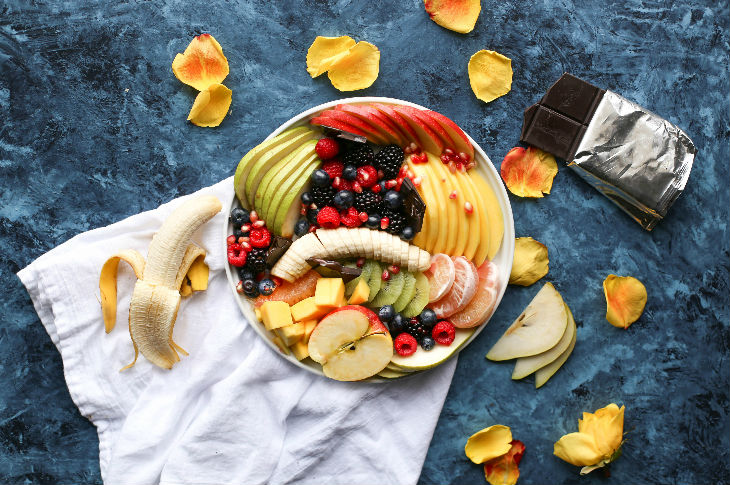
There’s no one-size-fits-all plan: People interpret fruitarianism to suit their needs. Some fruitarians start the day by juicing 10 oranges. Others eat a banana-berry smoothie. Still others sit down to enjoy a plate of mangoes, melon, and almonds. A growing subset of vegans describe themselves as fruitarians, which may mean that up to 75 percent or more of what they eat is fruit.
Some people only eat raw organic fruit, while others allow dried or frozen fruit. Some fruitarians permit nuts and seeds, which grow on trees and can be categorized as fruits. Similarly, some may eat grains, which are considered to be the fruits of the plants which produce them. Some fruitarians round out their diets with leafy greens or other vegan-friendly foods. Others only eat sweet fruits.
Nutrition experts consider fruitarianism a fad diet that could cause malnutrition because so many food groups are left out of the diet, yet enthusiasts believe that the eating style works for them. Many fruitarians only eat home-prepared foods, to ensure that they’re not getting unwanted ingredients from restaurants. Here’s what else fruitarians may experience:
Nibbling all day
Many fruitarians eat whenever they’re hungry, rather than consuming three meals. “You may find you are grazing,” says Beth Bluestone, RD, a registered dietitian at Cleveland Clinic Wellness. “The calories are more quickly absorbed than from other foods. You’re going to burn through it fast.”
Feeling bloated
The fiber and natural sugars in fruit may cause gassiness and bloating. “Some people have trouble digesting large quantities of fructose,” Bluestone says. “It can cause abdominal discomfort, diarrhea.” Tracy Morris, Fitbit’s nutritionist adds, “Still, the huge amount of fruit required to meet your daily calorie needs is likely to cause some degree of bloating for most people.”
Incorporating fats
A well-balanced diet contains fats, protein, and carbohydrates. Fruit is comprised mainly of carbohydrates, but fruitarians can get fat from avocados, nuts, and seeds. Plus, nuts and seeds may supply essential fatty acids. “One [essential fatty acid] in particular is omega 3’s,” Bluestone says. “That’s something that we can get from a plant source, but it depends if we are having nuts and seeds in the diet or not. Flaxseeds and walnuts, are a great source of omega 3’s.”
Seeking protein
It may be extremely difficult for fruitarians to get enough protein, although nuts, seeds, and grains can be valuable sources. “I would even recommend fruitarians include some eggs, beans, or even steak once in a while,” says Bart Wolbers, researcher at Nature Builds Health.
Vegans on a vegetable-rich can find it tricky to meet their protein needs if they aren’t including legumes or nuts and seeds—the fruitarian diet is extremely low in protein. We need essential amino acids, the building blocks of protein, to help to build and repair your muscles, organs, skin, blood, and to make different chemicals, like hormones, in your body. Fruit, although high in essential nutrients like fiber and vitamin C, isn’t a source of protein. “We’re not able to meet all those building blocks of those different essential amino acids when your diet is that highly restricted,” says Bluestone.
Considering supplements
Fruit contains fiber, vitamins, and antioxidants but is missing many essential nutrients that you need. “People who follow this diet can be at a significantly increased risk of deficiencies in iron, protein, vitamin D, calcium, zinc, vitamin B6, and vitamin B12,” says Amanda A. Kostro Miller, RD, LDN, who serves on the advisory board for Smart Healthy Living.
Strict fruitarians may not want to take supplements. “Protein supplements that are from a plant source, such as soy or pea protein would not fall into the fruitarian category, and that’s where it becomes challenging,” Bluestone says.
Rounding out the diet
Broadening your interpretation beyond sweet fruit will make the diet more balanced, healthier, and sustainable. Morris says, “Experts around the world agree we should all be eating more plants and less animal products—it’s better for our health and it’s better for the planet—but there’s no need to limit yourself to only fruit. Why eliminate whole food groups which have been shown to improve health and add years to your life? Filling your plate with foods like vegetables, whole grains, legumes, nuts, and seeds is a smart eating strategy.”
Signs the diet’s hurting your health
Fruitarianism isn’t for everyone. Ashton Kutcher made headlines in 2013 when he was hospitalized after following the diet. If you feel hungry constantly, it’s time to abandon the plan. Symptoms such as “low energy levels, confusion, tiredness, hair loss, hair thinning, muscle wasting, slow healing, extreme weight loss, or getting sick easier,” says Bluestone, are signs it’s time to ditch the diet.
How to safely eat a fruit-heavy diet
If you’re intrigued by the idea of subsisting mainly on fruits, ask a registered dietitian how to do it safely. “Talk about what your health goals are and what you’re trying to accomplish,” Bluestone says. “We can work together to make it happen, looking out to prevent malnutrition, and preventing them from adopting a long-term plan that would not be healthy.”
This information is for educational purposes only and is not intended as a substitute for medical diagnosis or treatment. You should not use this information to diagnose or treat a health problem or condition. Always check with your doctor before changing your diet, altering your sleep habits, taking supplements, or starting a new fitness routine.

If you have questions about a Fitbit tracker, product availability, or the status of your order, contact our Support Team or search the Fitbit Community for answers.
Please note: Comments are moderated and may not appear immediately after submission.